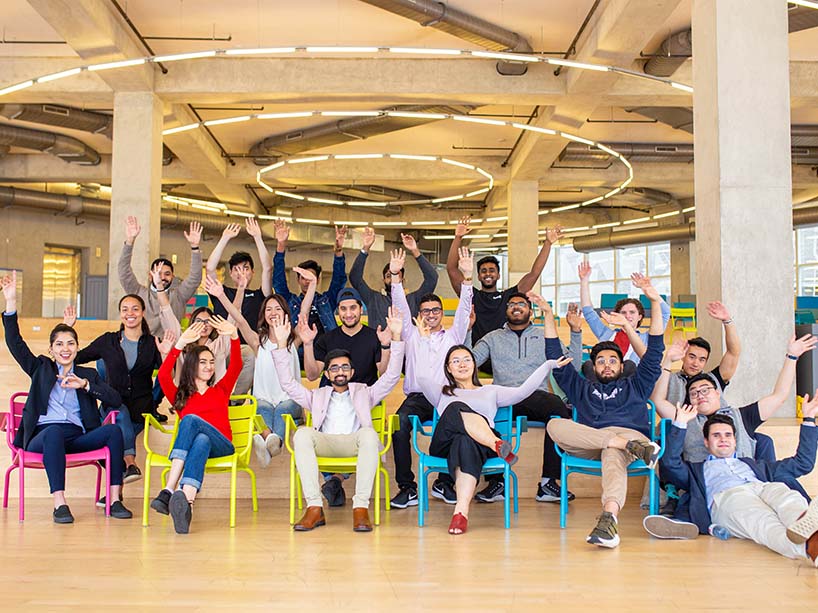Student entrepreneurs take their startups to new heights at the DMZ Basecamp

The DMZ Basecamp, an intensive summer program to help student entrepreneurs grow and focus their startups, moves ahead virtually again this summer. Meet two students who participated in the 2020 virtual Basecamp and learn about their experience. Photo courtesy of the DMZ, taken pre-pandemic.
The pandemic hasn’t put a stop to experiential learning at Ryerson University, and the DMZ Basecamp continues to move ahead virtually.
Basecamp is a global summer entrepreneurship program that helps students start viable companies through experiential learning opportunities. The eight-week intensive incubation program helps students to develop, market and accelerate their startup ideas faster with the help of fellow student innovators, industry mentors and successful entrepreneurs.
Learnings from Basecamp
Sundar Singh Manku (computer science ’18) completed Basecamp last summer after a one-year master’s of entrepreneurship program at Queens University. Now Manku is the chief executive officer of MedaKi (external link) , which is focused on increasing accessibility to health-care products and providers, specifically pharmaceuticals. The company allows users to connect directly with their local pharmacy. MedaKi was accepted into both the Science Discovery Zone and the Biomedical Zone, and won the top prize at the Ryerson Venture Zone Industry Challenge.
For Manku, Basecamp was the push he needed to take his ideas to the next level. “Just the association alone with the DMZ is really beneficial for us, because it’s recognized as one of the best incubation spaces in Canada and, because of this, it lent our startup more credibility,” he says.
Manku had already joined the Science Discovery Zone and was acquainted with the zone ecosystem at Ryerson. “Basecamp seemed like a good entry point for us because we still had some challenges that we were trying to solve with MedaKi and we were trying to do too many things at once.” Getting into Basecamp helped Manku clarify some of the existing challenges with his startup and prepare him to move into the next stage of development.
Elvira Da Silveira, who is nearing the completion of her degree in business management, joined Manku as a 2020 participant in Basecamp. Her startup, Mindset Masters (external link) , is a free online platform that empowers students to transition from a fixed mindset to a growth mindset through online learning and a machine learning algorithm. She was able to solve her own challenges through the intensive program.
“I applied for Basecamp with a startup called instant brand. It was a travel app that helped connect travellers with locals and, with the pandemic, I needed to pivot,” she says. “The idea for Mindset Masters came from one of the sessions that we had with a leadership coach who was phenomenal.”
Basecamp as a differentiator
Having access to the DMZ and Basecamp specifically as a student is one of Ryerson University’s differentiators, says Manku. “We were surrounded by young and ambitious entrepreneurs, who we were able to learn from throughout the program. For me it was important to take advantage of the incubation ecosystem that Ryerson has set up. Especially as a computer science student, when I applied to the program, the average to get in was 74. Now, it’s 89, and I think that has a lot to do with how Ryerson is associated with a startup ecosystem.”
Da Silveira says being around other student entrepreneurs helped her to focus her energy and learn from like-minded people. “To come to a place where we're all working toward the same goal with our startups, and having stimulating conversations, is great,” she says. “I learned things at Basecamp that were new to me, even having nearly completed the entrepreneurship program. Instead of just a knowledge-based approach, there were real-world opportunities for application. We were able to learn something and immediately apply it, and that's the best way to learn for me.”
Advice for other student entrepreneurs
For fellow students who are working toward launching their own startup, Manku says to just dive right in. “Having a space where you can ask your fellow students, your mentors as well as others means you’ll solve every problem along the way. So talk about it, seek all the resources and apply for everything. And Basecamp provides all that, including pivotal feedback that saved us years of work.”
Da Silveira says that, especially over the pandemic, she saw the need for multiple income streams and encourages fellow students to explore entrepreneurship if it interests them.
“It's not the way that it used to be where you’d graduate, get a job at a company for 30 years, and then you retire,” she says. “On average, from the ages of 25 to 34, people will change jobs five times. If you’re interested in starting a business, it doesn't even have to be something that you're looking to make full-time in the future, but just something that you're passionate about that can help to sustain you.”
The 2021 Basecamp cohort will run from July 5 to August 26. Interested students can still apply before June 22 on their website.